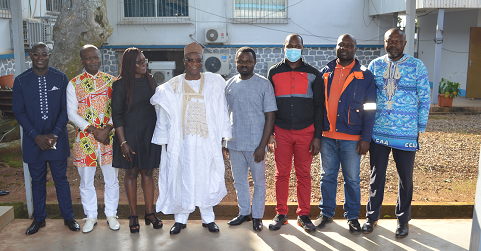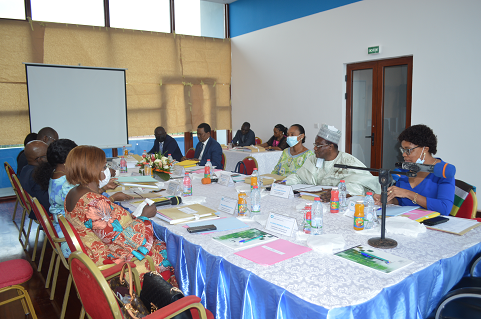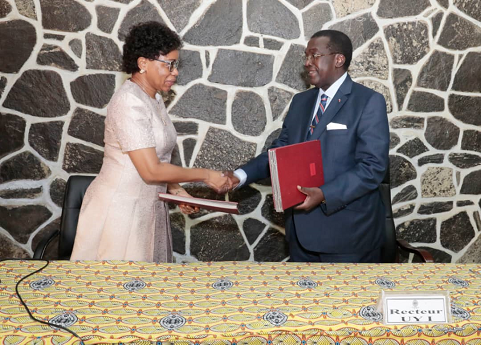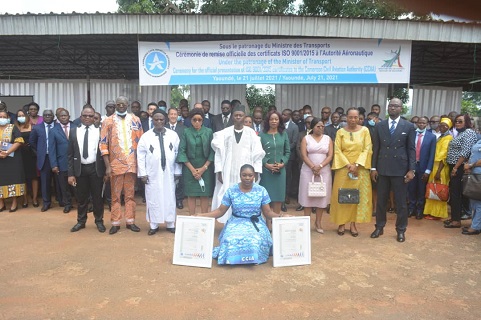Firefighter: Prevent… if not, Save!
The best option is undoubtedly the prevention of accidents on airport platforms. When they do occur, the aerodrome firefighter plays a key role in increasing the chances of passenger survival.
In the air navigation service, the Fire and Rescue Service plays a non-negligible role in the safety of flights. In order to increase the chances of survivors of an aircraft in an aviation accident, the existence of the SSLI is of paramount importance. This is why the Firefighter stands as the only assistance for the victims in an accident occurred in the aerodrome area and its surroundings. This competence is based on experience gained in the field, which complements the initial training obtained in competent and proved relevant training centers.
Two options are available for the Cameroonian youth to become a Firefighter (F.F). These are two structures that oftentimes request its services: the Agency for the Safety of Air Navigation in Africa and Madagascar (ASECNA) and the Cameroon Civil Aviation Authority (CCAA).
Whether it is ASECNA or the CCAA, the candidate for the profession of Firefighter must fulfill a number of criteria:
- Be physically and mentally fit;
- Be free from any disabilities;
- Be a holder of GCE A/Level or an automotive mechanical CAP or another equivalent recognized Certificate;
- Have a category C driver's license;
- Never been convicted;
- Should be between the ages of 25 and 30 at the date of the entrance examination;
- Should qualify for the entrance examination or selection test as the case may be;
The candidate must then pass the exam or test. These tests revolve around three axes, namely: physical exercise test; driving test of a truck vehicle; Knowledge test. Tests arrangements of the tests depends on either Organisation.
To exercise the profession of a Firefighter, the Regional School of Fire Safety (ERSI) based in Douala is authorised to issue the diplomas in Firefighting or a relevant qualification document. To do this, either employer (ASECNA - CCAA) takes charge of its future employee to either initial or on-site training.
Training
Initial training is given to the aspiring firefighter who was selected after the competition launched by ASECNA under the aegis of the ERSI. This training takes place at the ERSI for a period of six months and only candidates who have obtained an average of at least 12/20 are declared admitted to the AP profession go in for a final examination. In this case, tuition fee, accommodation and employment of the trainee are taken care of by ASECNA. On-site training is for the future F.F. recruited by the CCAA after a selection test. The latter is instructed on an airport platform managed by the CCAA by a supervisory technician from a school recognized for firefighting and rescue.
At the end of this on-site training, the length of which depends on the capacity of the AP to assimilate the instructions, the trainee must stay at the ERSI in Douala to carry out a qualification course at the end of which he leaves With a certificate attesting that he has the right to practice as a Firefighter at Aerodrome, provided that on completion of the qualification examination the trainee has obtained an average of 12/20.
Whether training is initial or on-site, instruction themes are the same:
- The daily and intensive practice of sportive and physical exercise (physical culture, team sports)
- The daily handling of working tool (fire vehicles)
- Practical exercises on real fire, installation fire, first aid, large and small equipment
- Theoretical courses: aircraft fire, installation light, fire technology, mechanical first aid - prevention, hydraulics, air traffic, organization of the SSLI and large and small equipment.
Given the fact that civil aviation is a constantly groundbreaking domain, during the course of his career, outside of initial training or on-site, the Firefighter benefits from refresher and retraining courses based on time recovery after the being trained on aspects like Guard duty, learning of group life, the culture of humanism. The firefighter is obliged to practice sport continuously, to observe a sober life in order to guarantee his physical health, to study at all times, to maintain and increase his intellectual knowledge, because he often works under difficult conditions at the risk of his Life from which the motto: "save or perish".











